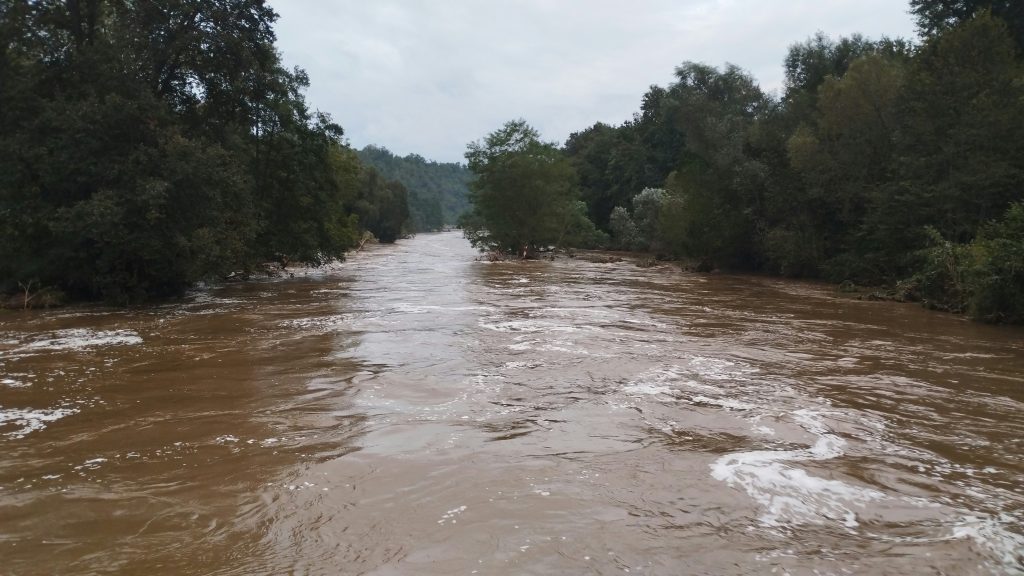Dolly Parton Steps Up for Flood Relief in East Tennessee
In a heartfelt response to the devastating floods caused by Hurricane Helene, renowned singer-songwriter Dolly Parton has pledged a remarkable $2 million towards relief efforts in East Tennessee. Speaking at a press conference in Newport, Parton expressed her deep sadness over the destruction that has impacted her beloved mountains and rivers, emphasizing her commitment to support the local community during this challenging time.
Parton, a native of the region, revealed that $1 million of her generous donation will be directed to the Mountain Ways Foundation, an organization dedicated to providing immediate assistance to those affected by the disaster. “These are my mountains… these are my rivers,” she passionately stated, highlighting her personal connection to the area and its residents.
The funds will be used to deliver critical support, including temporary housing, food, and medical aid for those displaced by the flooding. Parton’s philanthropic spirit shines through as she reassures the victims that they are not alone in their recovery journey.
At the press conference, the country music legend shared her vision of a united community coming together to rebuild and heal. Her contributions come at a time when local resources are stretched thin, and the need for aid is paramount.
In addition to her donation, Parton also called upon fellow artists, businesses, and individuals to join her in supporting the recovery efforts. The outpouring of generosity from the community has been overwhelming, with various organizations stepping up to provide additional funding and resources to aid those in need.
Parton’s commitment to her roots has always been evident throughout her career. From her charitable initiatives to her iconic music, she has consistently demonstrated a desire to uplift and empower her community. This latest act of kindness is yet another testament to her dedication and love for the people of East Tennessee.
As the region begins its long road to recovery, Parton’s contribution serves as a beacon of hope. Her actions not only provide immediate financial relief but also inspire others to contribute in any way they can, fostering a spirit of solidarity and resilience.
The singer’s efforts are a reminder of the power of compassion and community in the face of adversity. As East Tennessee navigates through the aftermath of Hurricane Helene, Dolly Parton’s unwavering support stands as a testament to the strength and unity that can emerge from such tragic circumstances.
With her continued involvement, there is hope that the affected communities will rebuild stronger than ever, and that the spirit of East Tennessee will shine brightly once again. Dolly Parton is not just a beloved entertainer; she is a true champion for her community, proving that even in the darkest times, there is always light to be found through generosity and love.
Tags: Dolly Parton, East Tennessee, Flood Relief, Hurricane Helene
Georgia Republican Calls for Accountability Amid Hurricane Helene Criticism
In a bold move that has sparked discussions across political circles, a prominent Georgia Republican has made a significant demand regarding the federal agency’s response to Hurricane Helene. As the storm wreaks havoc, leaving communities grappling with the aftermath, questions have arisen concerning the efficiency and effectiveness of the federal response.
The recent hurricane, which has been described as one of the most severe in recent years, brought to light not only the immediate challenges faced by affected communities but also the broader implications of governmental preparedness and response strategies. Critics have pointed out that the federal agency’s actions have not met the expectations of those whose lives have been disrupted by the disaster.
In this context, the Georgia Republican has taken to the forefront, advocating for a thorough review of the federal agency’s operations during natural disasters. This call for accountability comes as residents express their frustrations over the perceived slow response times and lack of adequate support during and after the hurricane.
As communities work tirelessly to rebuild and recover, the demand for accountability serves as a reminder of the crucial role that governmental agencies play in disaster management. The Republican’s insistence on a detailed evaluation of the agency’s performance could potentially lead to significant policy changes aimed at improving disaster response in the future.
The issue has resonated with many, leading to a broader conversation about how local, state, and federal agencies coordinate their efforts during emergencies. There is a growing consensus that a more streamlined approach is necessary for effective disaster management, ensuring that resources are allocated efficiently and that affected individuals receive timely assistance.
Moreover, this situation highlights the importance of transparency within governmental agencies. As citizens remain vigilant and seek answers, the demand for accountability could pave the way for enhanced oversight and public engagement in how disaster response strategies are formulated and implemented.
In the wake of Hurricane Helene, the call to action from the Georgia Republican not only seeks to address immediate concerns but also aims to foster a culture of preparedness that can withstand future natural disasters. The implications of this demand extend beyond the current crisis, potentially shaping the dialogue around disaster management policy for years to come.
As the recovery efforts continue, the focus remains on ensuring that agencies are held accountable for their actions and that communities receive the support they need to rebuild their lives. The demand for accountability may very well serve as a catalyst for change, prompting a reevaluation of how federal agencies respond to disasters and setting a precedent for future interactions between government and affected communities.
In conclusion, the current situation surrounding Hurricane Helene serves as a critical moment for reflection and action within the realm of disaster management. The Georgia Republican’s call for accountability is not just a response to current events; it is a clarion call for a more responsive and responsible approach to managing natural disasters. As the dust settles and recovery efforts are underway, the hope is that this demand will inspire meaningful change that prioritizes the needs of communities in their times of greatest need.
Tags: Disaster Response, Hurricane Helene, Marjorie Taylor Greene
FEMA Faces Funding Crisis Amid Hurricane Response
In a troubling turn of events, the Federal Emergency Management Agency (FEMA) is facing a funding crisis just as the nation grapples with the aftermath of Hurricane Helene, which has already claimed at least 215 lives and caused extensive flooding across coastal regions. Homeland Security Secretary Alejandro Mayorkas has acknowledged that while FEMA currently has enough resources to address immediate needs from the hurricane, its financial situation is precarious, raising concerns about the agency’s ability to sustain its operations throughout the remainder of the hurricane season.
The crisis has ignited a fierce political debate, with some lawmakers questioning the allocation of funds to various programs while others push for additional financial support for FEMA. Critics have pointed out that claims suggesting money spent on addressing illegal migration should instead be directed towards disaster relief are misleading. They argue that the current funding challenges are a direct result of political maneuvering that has stripped FEMA of the necessary resources it needs to effectively manage disaster responses.
As the situation unfolds, FEMA has assured that it is committed to assisting those affected by Hurricane Helene, coordinating efforts with state and local agencies to ensure timely relief and recovery measures. However, the agency’s long-term ability to respond to disasters remains in jeopardy if additional funding is not secured soon. The looming question is: who will step up to ensure FEMA has the resources it needs to fulfill its mission?
The ongoing discussions in Washington regarding FEMA’s funding not only reflect the agency’s struggles but also highlight broader issues of disaster preparedness and response in the face of increasing natural disasters linked to climate change. With hurricane season still underway, the stakes are high for countless communities that depend on FEMA’s support during times of crisis.
As lawmakers continue to debate the funding allocations, it is imperative for them to recognize the vital role of FEMA in disaster management and to take urgent action to reinforce the agency’s financial standing. The safety and well-being of American citizens depend on it. As the nation waits to see how the situation will unfold, one thing remains clear: the funding crisis at FEMA is a pressing issue that cannot be ignored.
Tags: Disaster Relief, FEMA, FEMA out of money, funding crisis, Hurricane Helene
FEMA Faces Funding Crisis Amidst Hurricane Helene Aftermath
In the wake of Hurricane Helene, FEMA’s Disaster Survivor Assistance crews have mobilized across Georgia, offering aid to residents grappling with the storm’s devastating impact. This catastrophic hurricane has claimed the lives of at least 200 individuals and left a trail of destruction characterized by severe flooding along the coast. As communities begin to recover from the trauma, the urgency for assistance has never been greater.
Despite the immediate help FEMA is providing, a looming funding crisis threatens to hinder the agency’s response throughout the remainder of the hurricane season. According to DHS Secretary Alejandro Mayorkas, FEMA is running out of resources, raising concerns about its ability to meet the needs of those affected by the recent disasters. In a chilling announcement, Mayorkas noted, “We do not have the funds to last” as the nation braces for the possibility of additional hurricanes.
The impact of Hurricane Helene has been felt across several states, with the death toll rising to 191 across six states, including a staggering 95 fatalities in North Carolina alone. The storm also left over 1.5 million residents without power, further complicating recovery efforts. In East Tennessee, victims of the flooding are urged to apply for federal funds quickly, which are available for temporary housing and necessary repairs.
FEMA’s assistance extends to both renters and homeowners who have experienced severe losses due to the hurricane. In North Carolina, the agency is prepared to provide crucial support for immediate needs, yet the clock is ticking for those affected to apply for assistance. As local governments remind residents of available help, the pressure mounts on FEMA to secure the necessary funding to continue its efforts.
As the agency navigates its financial constraints, the need for a comprehensive disaster relief strategy becomes increasingly apparent. The current situation underscores the importance of robust federal support for disaster management, particularly in the face of climate change and its associated risks. The potential for more hurricanes this season only heightens the urgency for sustainable solutions and adequate funding to ensure that affected communities can recover and rebuild.
As the nation watches the aftermath of Hurricane Helene unfold, the resilience of the affected communities shines through. Local organizations, volunteers, and residents are coming together to support one another, illustrating the power of community solidarity in times of crisis. However, without adequate federal assistance, the road to recovery may be long and arduous.
In conclusion, as FEMA continues its operations in the aftermath of Hurricane Helene, the agency faces the critical challenge of balancing immediate disaster response with long-term funding needs. The situation serves as a stark reminder of the vulnerabilities inherent in disaster management and the pressing need for a reevaluation of funding mechanisms to ensure that agencies like FEMA can effectively respond to future crises. The coming weeks will be pivotal in determining how communities affected by Hurricane Helene will rebuild their lives and whether FEMA can secure the resources necessary to support them effectively.
Tags: community support, Disaster Relief, FEMA, FEMA Hurricane Helene, funding crisis, Hurricane Helene
Buncombe County Faces Devastating Aftermath of Hurricane Helene
Buncombe County, North Carolina, is grappling with the severe repercussions of Hurricane Helene, which has left a trail of destruction and despair. As recovery efforts are underway, the community is coming together to support one another in these trying times.
The local authorities have reported that more than 600 individuals are still unaccounted for, raising concerns among families and friends who are desperately seeking information. The city manager of Black Mountain, John Harold, has been actively involved in coordinating the response efforts, emphasizing the need for community resilience and support.
In the wake of the storm, the Buncombe County Sheriff, Quentin Miller, confirmed that the death toll has tragically risen to 35, with many others suffering from injuries and the emotional toll of the disaster. As search and rescue operations continue, over 100 individuals have been successfully rescued from perilous situations, showcasing the bravery and dedication of local emergency services.
To assist in the recovery, 15,000 power crews from 19 states and Canada have descended upon the Carolinas, working tirelessly to restore electricity to homes and businesses affected by the hurricane. The restoration of power is a critical step in reviving the community, enabling residents to return to a semblance of normalcy.
In addition to addressing immediate safety concerns, local organizations are mobilizing to provide food and water to those affected by the storm. Distribution centers have been set up across the county, allowing residents to access essential supplies, including cleaning items and non-perishable food. Community members are encouraged to donate items such as baby wipes, water, and food to support their neighbors in need.
As the recovery process unfolds, the strength of the Buncombe County community is evident in the way individuals are stepping up to help each other. Volunteers are emerging from all corners, ready to lend a hand, whether through physical assistance in cleanup efforts or providing emotional support to those who have lost loved ones or property.
The road to recovery will undoubtedly be long and challenging, but the resilience and determination of the people in Buncombe County shine through in the face of adversity. The community is committed to rebuilding and healing together, demonstrating the power of unity in the face of tragedy. As updates continue to emerge, the focus remains on supporting those affected and ensuring that no one is left behind during this difficult time.
In the wake of Hurricane Helene, it is crucial for the broader community to stay informed and engaged in recovery efforts. Each contribution, whether big or small, can make a significant difference in the lives of those impacted by the hurricane. As Buncombe County begins to heal, the spirit of solidarity and compassion will guide the way forward, reminding everyone of the importance of coming together in times of crisis.
Tags: Buncombe County, community support, Hurricane Helene, Recovery Efforts
Bengals Seek First Win Against Panthers Amid Hurricane Challenges
In a highly anticipated Week 4 matchup, the Cincinnati Bengals are set to clash with the Carolina Panthers in Charlotte, North Carolina. This game holds significant importance for the Bengals, who are desperately seeking their first win of the season after a rocky start. The stakes are high as they face former starting quarterback Andy Dalton, who now leads the Panthers.
However, the game is taking place under the looming shadow of Hurricane Helene, which has already begun to impact the region. Bengals fans who traveled to North Carolina for the game are facing the brunt of the storm, with severe weather conditions expected to affect the game-day experience.
The Bengals, coming off a string of disappointing performances, are determined to turn their fortunes around. The team is well aware that a victory against the Panthers could provide the much-needed boost in morale they require at this stage of the season. The matchup is not just about the score, but also about proving that they can compete effectively in the league.
On the other hand, the Carolina Panthers are entering the game with momentum, having recently secured a win. They will be without several key players, including offensive lineman Damien Lewis and defensive tackle Shy Tuttle, which could influence the game’s dynamics. The absence of these players presents an opportunity for the Bengals to exploit weaknesses in the Panthers’ lineup.
As kickoff approaches, fans and analysts alike are closely scrutinizing both teams’ strategies. The Bengals will need to capitalize on their strengths, particularly their defense, to contain Dalton and the Panthers’ offensive plays. This matchup is also a testament to the resilience of the teams and their fans, especially those braving the storm to support their squad.
With the ever-changing weather conditions, the Bengals’ coaching staff must remain adaptable, devising strategies that can withstand not only the Panthers’ gameplay but also the elements. It promises to be a challenging yet thrilling game that could mark a turning point for the Bengals if they manage to secure a victory.
In summary, the Bengals vs. Panthers game is more than just a contest; it’s a battle against adversity both on and off the field. Fans are eager to see if their team can rise to the occasion and deliver the first win of the season, all while braving the harsh conditions brought on by Hurricane Helene. As the teams prepare for this pivotal matchup, the energy and anticipation among fans is palpable, setting the stage for a memorable NFL showdown.
Tags: Bengals, Bengals vs Panthers, Hurricane Helene, NFL
Devastation Unfolds in North Carolina as Hurricane Helene Leaves a Trail of Destruction
As the remnants of Hurricane Helene continue to wreak havoc across the southeastern United States, the picturesque landscapes of western North Carolina have turned into scenes of devastation. The historic village in Asheville is grappling with severe flooding that has left the region virtually unrecognizable, overwhelmed by the relentless downpour brought on by the storm.
Rescue operations have been underway, with local authorities successfully evacuating more than 200 individuals trapped by the rising waters. The North Carolina search and rescue teams have demonstrated remarkable bravery and commitment as they navigate treacherous conditions to save lives.
The impact of Helene has been catastrophic, with reports confirming over 50 fatalities across several states, including North Carolina. As communities mourn the loss of life, many residents are left without power, compounded by widespread cellular outages that hinder communication efforts. Essential services have been disrupted, and the affected areas are expected to face prolonged recovery challenges.
The scale of destruction is staggering, with over 400 roads remaining closed as authorities work tirelessly to assess the damage. The floodwaters, though beginning to recede, have revealed the full extent of the disaster, including blocked access roads and the threat of mudslides still looming.
Officials are urging caution, as the risk of additional landslides remains high due to the saturated ground conditions. The storm’s unpredictable path has left many communities isolated, with critical infrastructure severely impacted. As the state grapples with the aftermath of this historic storm, the urgency of repair and recovery efforts is paramount.
While the immediate crisis is being addressed, the long-term implications of Hurricane Helene’s wrath are yet to be fully understood. Experts warn that the region may face lingering effects for weeks to come, affecting everything from local economies to public health.
As North Carolina begins to count the financial and emotional toll of the devastation, residents are reminded of the power of community. Neighbors are banding together to support those in need, and local organizations are mobilizing resources to aid recovery efforts.
In the face of such adversity, the spirit of resilience shines through. The people of North Carolina are no strangers to natural disasters, and while the road to recovery may be long, their determination to rebuild and restore their communities remains unwavering.
As the storm continues to push its remnants through the Tennessee Valley, forecasts indicate potential for further rainfall, complicating recovery efforts. Residents are urged to remain vigilant and heed warnings as the situation evolves.
In this time of crisis, the focus must remain on the safety and well-being of those affected. As the state pulls together in the wake of Hurricane Helene, the collective strength and solidarity of the community will play a crucial role in overcoming the challenges ahead.
The journey to recovery will be arduous, but with hope, support, and resilience, North Carolina will rise from the waters of devastation stronger than before.
Tags: helene death toll, Hurricane Helene, North Carolina Flooding, North Carolina Hurricane
Duke Energy Works Tirelessly to Restore Power After Hurricane Helene
As Hurricane Helene wreaked havoc across the southeastern United States, Duke Energy has been at the forefront of efforts to restore power to affected areas. The storm, which brought heavy rains, strong winds, and the threat of tornadoes, left over 1.34 million customers in North Carolina and South Carolina without electricity. By 4 p.m. on the day following the storm, Duke Energy had managed to restore power to more than 380,000 customers, demonstrating their commitment to service during emergencies.
In Western North Carolina and the Upstate of South Carolina, residents faced difficult conditions. The winds were fierce, and the continuous rainfall caused flooding that complicated restoration efforts. Duke Energy’s crews worked around the clock, navigating through hazardous conditions to restore power as quickly and safely as possible.
The company warned that some customers might face prolonged outages lasting several days due to the extent of the damage caused by the storm. Crews were deployed to assess the situation and prioritize the restoration of power to critical infrastructure first, such as hospitals, emergency services, and shelters.
Despite the challenges posed by Hurricane Helene, Duke Energy’s response teams remained undeterred. They utilized advanced technology and extensive experience in disaster management to coordinate and execute their restoration plans effectively. The company also encouraged residents to stay updated on their restoration efforts through their dedicated news center and customer service lines.
As the storm subsided, the focus shifted to clean-up and restoration. Duke Energy emphasized the importance of safety during this process, urging citizens to stay clear of downed power lines and report any hazards immediately. The company also reminded everyone to be prepared for potential future outages by having emergency kits ready and staying informed through local news and alerts.
Community leaders and local officials praised Duke Energy for their swift action and commitment to restoring power. They acknowledged the frustration felt by residents stranded without power but assured them that help was on the way. Duke Energy’s comprehensive approach and their ability to mobilize resources effectively were critical in mitigating the storm’s impact on the community.
In the aftermath of Hurricane Helene, Duke Energy is not only focused on power restoration but also on supporting the communities they serve. They are engaging with local organizations to assist those most affected by the storm and provide necessary resources during this challenging time.
As the recovery process continues, Duke Energy remains dedicated to improving their infrastructure and response strategies to better withstand future storms. The company’s proactive measures and commitment to service exemplify their mission to deliver reliable energy and support their customers through thick and thin. As they navigate the recovery from Hurricane Helene, Duke Energy stands as a beacon of resilience and community support, ensuring that no customer is left behind in the dark.
Tags: Duke Energy, Hurricane Helene, Power Restoration
Asheville Faces Devastation as Hurricane Helene Causes Historic Flooding
Asheville, North Carolina, a picturesque city known for its vibrant arts scene and stunning mountain vistas, is grappling with the aftermath of Hurricane Helene, which has left the community reeling from unprecedented flooding. The storm, which made landfall with heavy rains and strong winds, has caused significant damage to infrastructure, homes, and businesses throughout the region.
Residents of Asheville have reported harrowing experiences as the Swannanoa River swelled and overflowed its banks, inundating streets and neighborhoods. Eyewitness accounts describe moments of fear and anxiety as floodwaters rapidly rose, leaving many scrambling to evacuate their homes. Emergency services have been stretched thin as they respond to numerous distress calls from residents trapped by the rising waters.
In response to the escalating situation, city officials have implemented a curfew to ensure public safety amid widespread flooding and power outages. The Asheville Water Resources Department has also reported low water pressure and outages in Buncombe County, further complicating the recovery efforts.
The flooding has not only affected residential areas but has also severely impacted downtown Asheville, where floodwaters have wreaked havoc on local businesses. Main streets that once buzzed with life are now submerged, with many establishments facing significant damage. The community is coming together to support those affected, with volunteers mobilizing to assist with cleanup efforts and provide shelter to those displaced by the storm.
As rescue operations continue, authorities are urging residents to remain vigilant as the threat of landslides looms over the region. The heavy rains have saturated the ground, increasing the risk of further geological instability in the coming days.
The city’s response team is working tirelessly to assess the damage, restore power, and ensure that the needs of the community are met. As Asheville begins the recovery process, local leaders are focusing not only on immediate relief efforts but also on long-term strategies to mitigate future flood risks.
The impact of Hurricane Helene serves as a stark reminder of the increasing frequency and intensity of tropical storms in recent years. As climate change continues to alter weather patterns, communities like Asheville must prepare for the potential of more severe storms and flooding in the future.
In the face of this disaster, the spirit of the Asheville community shines through. Neighbors are helping one another, local organizations are rallying resources, and there is a collective determination to rebuild and recover. As this resilient city navigates the challenges posed by Hurricane Helene, the road ahead may be long, but the strength of its community will undoubtedly guide it through the recovery process.
Tags: Asheville, Asheville Flooding, Hurricane Helene, hurricane helene death toll
Hurricane Helene’s Devastating Impact on Anna Maria Island
BRADENTON BEACH – The tranquil shores of Anna Maria Island have been transformed into scenes of devastation following the unexpected wrath of Hurricane Helene. Just a day after the storm, Gulf Drive, a vital artery of the island, is unrecognizable, buried under several feet of sand and littered with sinkholes and buckled pavement. The storm, which primarily stayed offshore, unleashed a powerful storm surge that wreaked havoc on this popular destination.
Officials have reported that nearly every ground-level home on Anna Maria Island experienced flooding, with many residents waking up to find their properties submerged. The extent of the damage has prompted local authorities to impose a curfew across the three cities on the island—Bradenton Beach, Holmes Beach, and Anna Maria City—while they assess the situation and ensure the safety of residents and visitors alike.
In a concerted effort to manage the aftermath, Manatee County officials have restricted access to Anna Maria Island, Flamingo Cay, and Longboat Key. This measure aims to protect residents and tourists from entering hazardous areas while assessments and recovery efforts are underway. The storm has not only affected the homes and infrastructure but has also disrupted the local economy, reliant on tourism and seasonal visitors.
The local police department in Holmes Beach has been actively involved in monitoring the situation, ensuring that safety protocols are followed during this recovery phase. The damages reported are severe, with officials describing the aftermath as catastrophic. The community is rallying together, but the road to recovery will be long and challenging.
As the island begins to grapple with the storm’s impact, residents are urged to stay informed through local news channels and social media for updates on recovery efforts and safety information. With the initial assessments underway, the community’s resilience will be tested as they begin to rebuild their beloved island.
In the coming days, further evaluations will provide a clearer picture of the total damages incurred and the necessary steps for recovery. Community leaders emphasize the importance of solidarity and support during this difficult time, as they work tirelessly to restore normalcy to Anna Maria Island. The effects of Hurricane Helene will be felt for a long time to come, but the spirit of the community remains strong, and together they will face the challenges ahead.
Tags: Anna Maria Island, community resilience, Hurricane Helene, Storm Damage









